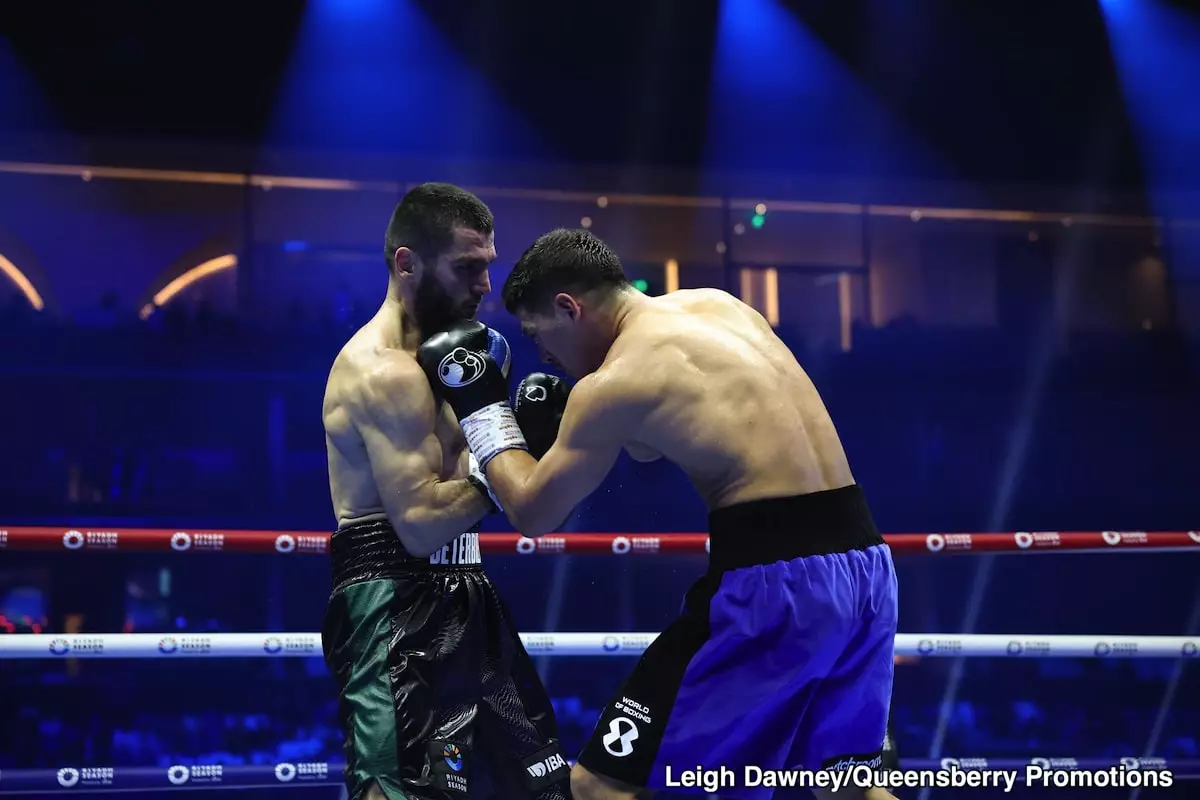By BoxingHit Staff-
The recent light heavyweight title bout between Artur Beterbiev and Dmitry Bivol has ignited discussions and dissent in the boxing community, particularly concerning the judges’ verdict. Tim Bradley, a prominent commentator and former champion, took it upon himself to re-evaluate the match. His conclusion, which aligns with the judges’ scoring of a majority decision favoring Beterbiev, has sparked a broader discourse on the nature of competitive boxing, scoring criteria, and fan perceptions of “robbery.”
The match itself was a showcase of contrasting styles. Beterbiev, known for his ferocious power, entered the ring with a perfect record of 21 wins, 20 of which came by knockout. In stark contrast, Bivol’s approach relied heavily on evasiveness and defensive maneuvers. While the aesthetic appeal of Bivol’s defensive tactics was evident, the effectiveness in terms of offensive output is what ultimately drew the attention of the judges.
As Bradley notes, accusations of robbery often arise when fans feel that their favored fighter has been unjustly deprived of a victory. In this instance, a segment of the audience, alongside some promoters and media figures, quickly labeled the decision as a robbery, primarily due to the impressive footwork and head movement exhibited by Bivol during the early rounds. However, this assertion merits scrutiny.
Boxing is governed by rules that prioritize not only the volume of punches thrown but also their impact and effectiveness. Bradley emphasizes that although Bivol managed to evade many of Beterbiev’s shots, he simultaneously neglected to engage in his own offense. In the latter parts of the fight, especially from the sixth round onward, Bivol’s reluctance to exchange blows shifted the momentum back to Beterbiev. The judges, far from blind to the nuances of the fight, appeared to have favored those moments when Beterbiev seized control as Bivol backed off.
The core of Bradley’s argument rests on the idea that the judges’ perceptions were influenced by Bivol’s defensive but passive strategy. He stated that for a fighter who spends significant time on the defensive, the risk lies in appearing ineffective. Bivol’s tendency to retreat after suffering a hard shot in the sixth round left lasting impressions, both visually and tactically. As Bradley observed, Bivol’s visible bruising and marked face indicated the effectiveness of Beterbiev’s punches, even if they appeared comparatively less forceful.
Adding to the complexity of this analysis, Chris Algieri, another seasoned pundit, argued from a different angle. He acknowledged Bivol’s dominance in earlier rounds but pivoted to highlight the importance of concluding rounds strongly. He suggested that Bivol let pivotal moments slip through his fingers, particularly in rounds 10 and 11. This raised a salient point about ring generalship: effective scoring doesn’t merely reward the number of punches but also the significance and timing of those punches.
This bout underscores the inherently subjective nature of boxing judging. While many fans romanticize an aggressive, high-output style, the reality is more nuanced, where defensive tactics can coexist with power punches to create a multifaceted fight. To label this outcome a robbery not only diminishes the complexity of the sport but also masks the strategic interplay that took place in the ring.
Ultimately, Bradley’s reaffirmation of the judges’ decision, juxtaposed against the voices of dissent, encapsulates the cyclical debate within boxing regarding how best to evaluate performance. The Beterbiev-Bivol fight serves not merely as a contest of skill but as a reflection of how perceptions, styles, and the criteria of scoring can shift narratives and sentiments across the boxing landscape. Rather than focusing solely on the outcome, it is imperative for fans and participants of the sport to engage in thoughtful discussions regarding what they value in boxing: a commitment to engagement and effectiveness rather than mere avoidance of punishment.


Leave a Reply